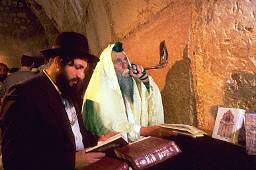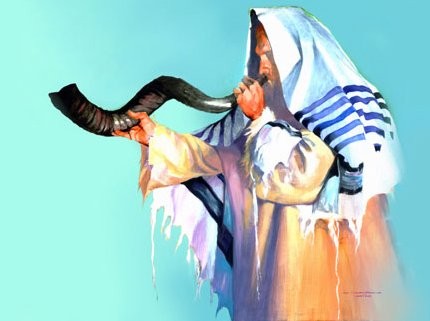Pastors and Prophets; roles in conflict
The 'sola pastora' (single pastor) model within the Christian church imposes conflicting responsibilities and stress on those persons who, as individuals, are required both to keep the peace and proclaim the Truth.
"But if the watchman see the sword come, and blow not the trumpet, and the people be not warned; if the sword come, and take any person from among them, he is taken away in his iniquity; but his blood will I require at the watchman's hand."
Ezekiel 33:6
The pastor and the prophet

Conflicting roles
In the Christian church (as it is currently structured) a reluctance to speak on important, but controversial topics is a serious problem.
It is a problem which has been around since the early centuries when ‘settled ministries’ were formed around one individual who inevitably, sooner or later, had to choose between speaking pastorally or prophetically. (This is not to say that these features of ministry cannot be combined; but there are also important times when they are in direct conflict.)
A convenient blind-side
 Ezra was, as the Bible tells us, a priest who led a contingent of the exiles from Babylon back to Jerusalem in order to re-establish the Jewish religious life in the city and land (Ezra 7:6 - 28). Ezra was, as the Bible tells us, a priest who led a contingent of the exiles from Babylon back to Jerusalem in order to re-establish the Jewish religious life in the city and land (Ezra 7:6 - 28).
Having made the return trip to Jerusalem from Babylon and offered sacrifices, the ‘princes’ (civic leaders) approached Ezra with a searing indictment of the people’s behaviour (Ezra 9:1-2). However one might think that Ezra should have, in his priestly position, been very aware of the problem himself; and not needed these ‘community heads’ to identify the matter of ‘foreign wives’ to him. And in his role as a scribe, he would have been well familiar with God's commandments.
However, and in his defence, Ezra did in fact respond directly to the challenge. He set to ‘rending his heart’ before the Lord concerning the people’s unfaithfulness having ‘forsaken [God’s] commandments’ (Ezra 9:10) regarding inter-marriage ‘in an unclean land with the uncleanness of the peoples of the lands’ (Ezra 9:11).
While Ezra was praying, the Spirit of God was also at work in the hearts of those with him. One of their representatives came to Ezra and said: “Now let us make a covenant before our God to send away all these women and their children, in accordance with the counsel of my lord and of those who fear the commands of our God. Let it be done according to the Law" (Ezra 10:3).
Where the buck stops
 It was a tough call; but Shecaniah didnt’ stop there. (And here is where the finger of God points directly at us – straight out of the page.) It was a tough call; but Shecaniah didnt’ stop there. (And here is where the finger of God points directly at us – straight out of the page.)
Ezra was bidden:
"Arise! For this matter is your responsibility.." (Ezra 10:4a).
There was no way out for the priest. He was in that position of responsibility: the buck stopped right at his feet.
However Shecaniah also encouraged the servant of God: “..but we will be with you; be courageous and act” (Ezra 10:4b)
So the conviction then had to be turned to actions.
On a cold rainy day..
Thus it was that Ezra had the unenviable task – in the middle of winter on a cold day of heavy rain – to spell out the fateful indictment regarding intermarriage: (Ezra 10:11). There was some rebellion in the ranks (Ezra 10:15), but on the whole the people were obedient to the command. And while Ezra might have been a shade reluctant to face up to challenging the sin which had remained unchecked, ultimately he grasped the nettle and got the job done.
This is the responsibility that ‘leadership’ brings. In our day too, some messages might be as ‘hard’ as that of Ezra’s time, but it is essential to the well-being of the body of Christ that the statutes of God are preached with unflinching honesty and boldness.
Voices in the (otherwise-silent) wilderness
In recent conversation, a minister from a mainstream denomination remarked that there were three subjects which preachers like himself were (generally) unwilling to tackle – for the reason that to do so would create so much trouble.
[ In fact since that conversation, and even though one of the subjects (homosexuality) has become almost impossible to ignore, teaching from pulpits on the subject is still relatively rare. And preaching on the other two headings is virtually non-existent. ]
However, there are men of integrity and courage, but to speak out can be costly as the recent case of a Highland minister illustrates. Rev. Paul Gibson is not the only preacher who has had to bear the consequences of addressing 'sin in the camp'; others have also had to experience radical changes in their ministries and journeys of faith as a result of holding fast to the faith first delivered to the saints.
The Lord however is faithful, and He rewards those who stand by his statutes and faithfully discharge the responsibilities of their role (Ezek 3:21). Of course the converse is also true (Ezek 3:20).
In the presence of God and of Christ Jesus, who will judge the living and the dead, and in view of his appearing and his kingdom, I give you this charge:
Preach the Word; be prepared in season and out of season; correct, rebuke and encourage-- with great patience and careful instruction.
For the time will come when men will not put up with sound doctrine. Instead, to suit their own desires, they will gather around them a great number of teachers to say what their itching ears want to hear. They will turn their ears away from the truth and turn aside to myths.
(2 Tim 1:4)
-------------
 Picture of a Prophet Picture of a Prophet
By Leonard Ravenhill
The prophet in his day is fully accepted of God and totally rejected by men.
Years back, Dr. Gregory Mantle was right when he said, "No man can be fully accepted until he is totally rejected." The prophet of the Lord is aware of both these experiences. They are his "brand name."
The group, challenged by the prophet because they are smug and comfortably insulated from a perishing world in their warm but untested theology, is not likely to vote him "Man of the year" when he refers to them as habituates of the synagogue of Satan!
The prophet comes to set up that which is upset. His work is to call into line those who are out of line! He is unpopular because he opposes the popular in morality and spirituality. In a day of faceless politicians and voiceless preachers, there is not a more urgent national need than that we cry to God for a prophet! The function of the prophet, as Austin-Sparks once said, "has almost always been that of recovery."
The prophet is God's detective seeking for a lost treasure. The degree of his effectiveness is determined by his measure of unpopularity. Compromise is not known to him.
He has no price tags.
He is totally "otherworldly."
He is unquestionably controversial and unpardonably hostile.
He marches to another drummer!
He breathes the rarefied air of inspiration.
He is a "seer" who comes to lead the blind.
He lives in the heights of God and comes into the valley with a "thus saith
the Lord."
He shares some of the foreknowledge of God and so is aware of
impending judgment.
He lives in "splendid isolation."
He is forthright and outright, but he claims no birthright.
His message is "repent, be reconciled to God or else...!"
His prophecies are parried.
His truth brings torment, but his voice is never void.
He is the villain of today and the hero of tomorrow.
He is excommunicated while alive and exalted when dead!
He is dishonored with epithets when breathing and honored with
epitaphs when dead.
He is a schoolmaster to bring us to Christ, but few "make the grade" in his class.
He is friendless while living and famous when dead.
He is against the establishment in ministry; then he is established as a saint
by posterity.
He eats daily the bread of affliction while he ministers, but he feeds the Bread of
Life to those who listen.
He walks before men for days but has walked before God for years.
He is a scourge to the nation before he is scourged by the nation.
He announces, pronounces, and denounces!
He has a heart like a volcano and his words are as fire.
He talks to men about God.
He carries the lamp of truth amongst heretics while he is lampooned by men.
He faces God before he faces men, but he is self-effacing.
He hides with God in the secret place, but he has nothing to hide in
the marketplace.
He is naturally sensitive but supernaturally spiritual.
He has passion, purpose and pugnacity.
He is ordained of God but disdained by men.
Our national need at this hour is not that the dollar recover its strength, or that we save face over the Watergate affair, or that we find the answer to the ecology problem. We need a God-sent prophet!
I am bombarded with talk or letters about the coming shortages in our national life: bread, fuel, energy. I read between the lines from people not practiced in scaring folk. They feel that the "seven years of plenty" are over for us. The "seven years of famine" are ahead. But the greatest famine of all in this nation at this given moment is a FAMINE OF THE HEARING OF THE WORDS OF GOD (Amos 8:11).
Millions have been spent on evangelism in the last twenty-five years. Hundreds of gospel messages streak through the air over the nation every day. Crusades have been held; healing meetings have made a vital contribution. "Come-outers" have "come out" and settled, too, without a nation-shaking revival. Organizers we have. Skilled preachers abound. Multi-million dollar Christian organizations straddle the nation. BUT where, oh where, is the prophet? Where are the incandescent men fresh from the holy place? Where is the Moses to plead in fasting before the holiness of the Lord for our moldy morality, our political perfidy, and sour and sick spirituality?
GOD'S MEN ARE IN HIDING UNTIL THE DAY OF THEIR SHOWING FORTH. They will come. The prophet is violated during his ministry, but he is vindicated by history.
There is a terrible vacuum in evangelical Christianity today. The missing person in our ranks is the prophet. The man with a terrible earnestness. The man totally otherworldly. The man rejected by other men, even other good men, because they consider him too austere, too severely committed, too negative and unsociable.
Let him be as plain as John the Baptist.
Let him for a season be a voice crying in the wilderness of modern theology and
stagnant "churchianity."
Let him be as selfless as Paul the apostle.
Let him, too, say and live, "This ONE thing I do."
Let him reject ecclesiastical favors.
Let him be self-abasing, non self-seeking, non self-projecting, non self-righteous,
non self-glorying, non self-promoting.
Let him say nothing that will draw men to himself but only that which will move
men to God.
Let him come daily from the throne room of a holy God, the place where he has
received the order of the day.
Let him, under God, unstop the ears of the millions who are deaf through the
clatter of shekels milked from this hour of material mesmerism.
Let him cry with a voice this century has not heard because he has seen a vision
no man in this century has seen.
God send us this Moses to lead us from the wilderness of crass materialism, where the rattlesnakes of lust bite us and where enlightened men, totally blind spiritually, lead us to an ever-nearing Armageddon.
God have mercy! Send us PROPHETS!
Copyright © 1994 by Leonard Ravenhill
|